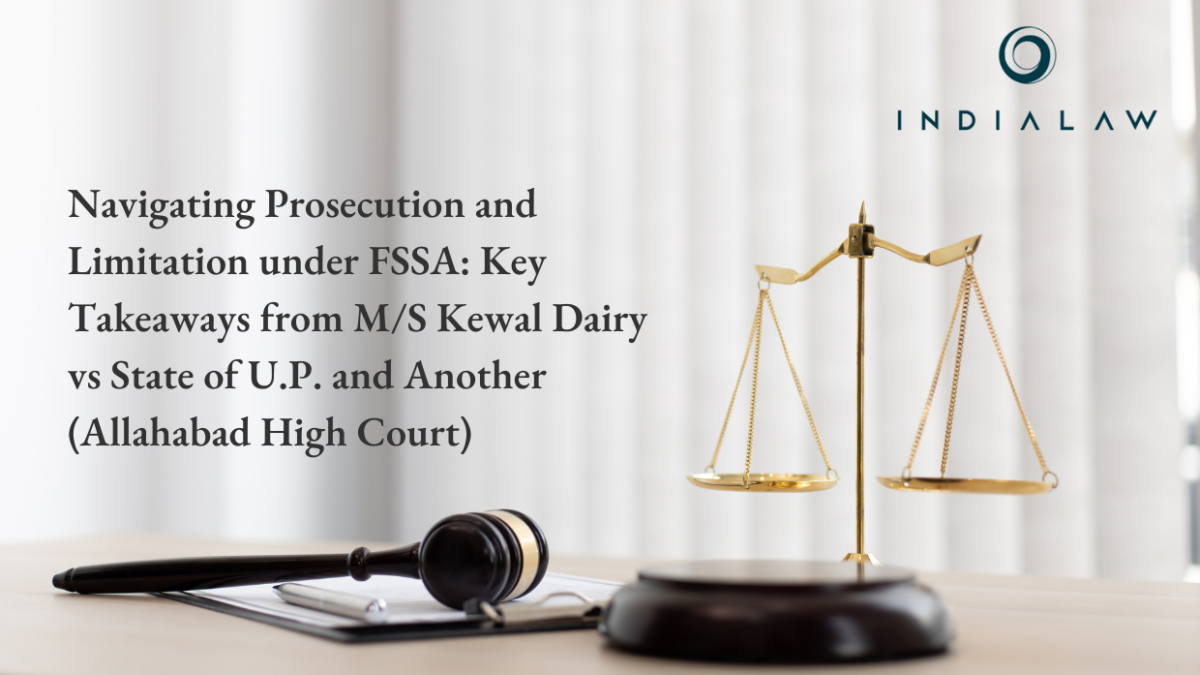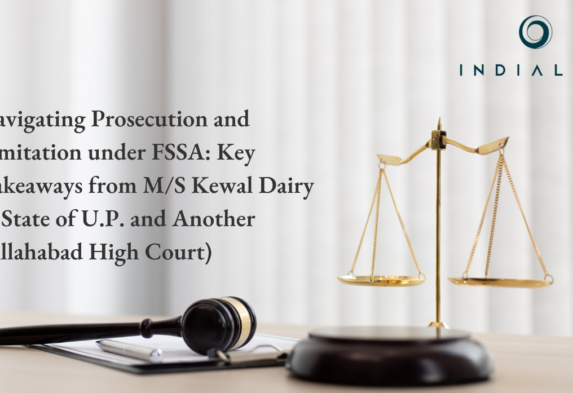Navigating Prosecution and Limitation under FSSA: Key Takeaways from M/S Kewal Dairy vs State of U.P. and Another (Allahabad High Court)


Facts of the Case:
The case arose from an incident where a milk sample was collected on November 24, 2017, by a Food Safety Officer (FSO) from the premises of the applicant, M/S Kewal Dairy. The milk was found sub-standard and unsafe based on food analyst reports dated December 10, 2017, and April 25, 2018, respectively. The FSO sought approval from the Commissioner, Food Safety, on May 14, 2018, and approval for prosecution was granted on June 20, 2019, more than a year after the sample collection. The complaint was filed on July 4, 2019, under Sections 51 and 59(i) of the Food Safety and Standards Act, 2006 (FSSA).
The applicant sought quashing of the complaint, alleging procedural lapses and limitation issues.
Prosecution’s Case:
- The milk sample collected was found sub-standard and unsafe, constituting a violation under the FSSA.
- Section 77 of the FSSA permits the Commissioner of Food Safety to extend the prosecution limitation period from one year to three years, which was invoked in this case.
- The prosecution argued that under Section 89 of the FSSA, the provisions of the FSSA override other laws, including the Criminal Procedure Code (CrPC).
Contentions by the Applicant (Defendant):
- Bar of Limitation:
- The complaint was time-barred under Section 468 of the CrPC, as the sample was collected on November 24, 2017, but the complaint was filed more than one year later on July 4, 2019.
- They also argued that even if Section 77 of the FSSA applied, the Commissioner did not record reasons for extending the limitation period.
- Wrongful Section Application:
- As the milk was merely sub-standard, the prosecution should have been under Section 51, not Section 59(i) (which pertains to unsafe food).
Key Legal Issues Addressed by the Court:
- Applicability of Limitation Period:
- Section 77 of the FSSA specifies a one-year limitation period, extendable to three years by the Commissioner for recorded reasons.
- The Commissioner granted approval within three years, and the court excluded the time taken for approval under Section 470(3) of the CrPC, making the complaint timely.
- Overriding Effect of FSSA:
- Section 89 of the FSSA grants overriding authority to its provisions over any conflicting laws, including Section 468 of the CrPC.
- Date of Commission of Offence:
- The court relied on State of Rajasthan vs Sanjay Kumar (1998) and held that the date of commission of the offence under the FSSA is when the food analyst’s report is received (here, December 10, 2017), not the date of sample collection.
Case Laws Considered:
- Ashok Kumar Pal vs State of U.P.:
- Held that the date of commission of an offence under the FSSA can be deemed as the date of sample collection; however, this was treated as an observation, not binding precedent.
- State of Rajasthan vs Sanjay Kumar (1998) 5 SCC 82:
- Ruled that for certain offences, limitation starts from when the offence is discovered (e.g., analyst’s report), not the date of occurrence.
- Sarah Mathew vs Institute of Cardio Vascular Diseases (2014) 2 SCC 62:
- Clarified that for limitation under Section 468 CrPC, the date of filing the complaint is decisive, not the date of cognizance by the magistrate.
- Ram Nath vs State of U.P. (2024) 3 SCC 502:
- Affirmed the FSSA’s overriding effect on other laws, including the CrPC.
Final Judgment:
- The court dismissed the application for quashing the complaint, holding that:
- The complaint was not barred by limitation due to the extended period allowed under Section 77 of the FSSA.
- The Commissioner had recorded reasons for granting approval for prosecution.
- The issue of whether the applicant should be prosecuted under Section 51 or Section 59(i) was a matter for trial and could not justify quashing the proceedings.
- The court upheld the principle that FSSA provisions override CrPC, ensuring the prosecution was legally valid.
This decision reinforces the primacy of the FSSA in food safety matters and highlights the nuanced interpretation of limitation and procedural requirements under specialized legislation.
For further details write to contact@indialaw.com




